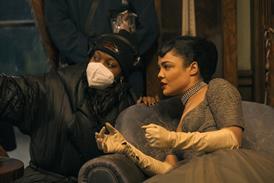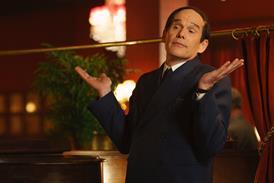In late April, Aneta Lesnikovska screened her debut feature Does It Hurt' - The First Balkan Dogma in Skopje, Macedonia. The screening in her homeland followed various festival outings, starting with the world premiere in the Tiger Competition in Rotterdam and also including the Bermuda International Film Festival where the jury (including Richard Dreyfuss and Carrie Fisher) gave it a special jury award for innovative film-making. It will also screen in Buenos Aires, Barcelona, Taipei and Brussels.
Does It Hurt' has already proved controversial. Some critics have attacked Lesnikovska for the way she manipulated and misled her actors, who were led to believe she had secured Danish backers for the movie.
Yes, she spoke to Zentropa. And Does It Hurt' is officially certified as the 73rd Dogme movie. Nonetheless, as she admits, the Danes eventually passed on the project.
The film is a self-reflexive affair: a movie about the making of a movie. It deliberately blurs lines between reality and fiction. "It's not just about manipulating the way you make a film, which is what Dogme does, but it is also trying to manipulate the people in the film to see how far they will go."
The actors were ostensibly her friends and were eager to appear in the movie. She is unapologetic about the way she used them. "It was a very thin line. I did use them (the actors) but I was also used by them," she says. "We were not very protective of each other. But that mirrors the societies of some of those transition countries. It's not about being nice anymore. It's about having money to buy your food and clothes and house."
One key scene - in which a couple are filmed having sex and the woman then worries about how the footage will be used - is especially uncomfortable to watch. "It was not scripted, that scene," Lesnikovska recalls. "We had the agreement that we wouldn't use the material for the posters and PR to sell the film like a sex film.
"The sex scene is not supposed to make you horny. It's about that discomfort. Having sex is like anything else in life. It's not a big deal, but once you're witnessing it, it should not make you feel comfortable. You're not supposed to be there with those two people."
Does It Hurt' is notable as one of the first Kosovan-Macedonian co-productions in film history. "We didn't get any money to make the film so I needed somebody to come in with equipment. The people from Kosovo were the ones who had it," the Macedonian director recalls of the unlikely collaboration (political tensions remain acute between the two nations).
Lesnikovska is working on the script for a new feature, One More Thing, which she hopes to make as a UK-Dutch co-production. She has already received development funding from the Dutch Film Fund and may take it to the Binger Lab in Amsterdam.
Lesnikovska is based in the Netherlands, and the story of how she got there could make a film script in its own right. She was on the way to London hoping to study film directing, and was passing through the Netherlands in the early 1990s when war broke out in Macedonia. Lesnikovska found herself stranded in the country with a Yugoslavian passport that was no longer valid. She stayed put, studied and eventually took a Dutch passport.
Macedonia is hardly a film-making hub, but Does It Hurt' is the first in a number of new films from the region. Other titles due include Igor Ivanov's Turned Round; Teona Mitevska's I Come from Titov Veles; and Shadows by former Golden Lion winner Milcho Manchevski.
Lesnikovska was shooting Does It Hurt' in Macedonia at the same time Manchevski was working on his feature. "It was like the little and the big brother thing. We didn't get that much attention. But he's one of the godfathers of Macedonian cinema. In that sense, he always indirectly or directly helps film-makers from that region."

















No comments yet